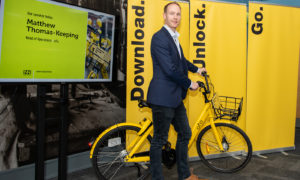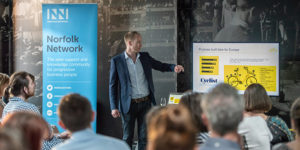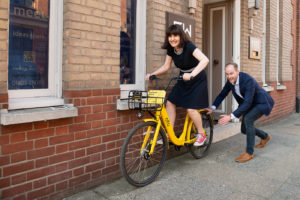Thursday nights networking event was hot, very hot. But record breaking April temperatures didn’t put anyone off. ofo’s Head of Operations for Norwich, Matthew Thomas-Keeping, joined Norfolk Network to share insights and expertise on the sharing-economy and to reveal how ofo have harnessed tech to address the universal challenge of moving around urban areas.
Written for Norfolk Network by Wiio.
ofo was founded in 2014, and is the world’s first dock-less bicycle sharing system in the world. The European arm of the business started just down the road in Cambridge, making the UK the first city in Europe to embrace the idea of shared transportation systems. They now have 250 million registered users and 14 million bikes around the globe, and have rolled out in London, Oxford and Sheffield in the UK with more to come.
It’s not your bicycle, it’s everyone’s bicycle.
 As a living wage employer and believer in the power of sharing economies, ofo are all about providing something that everyone can access and that have tangible benefits to society as a whole. The App-based dock-less system (where you don’t have to return the bike to any particular place at all) has meant that ofo have solved the problem of the “first and last mile of a commute”. Bike hire is cheap, quick and easy via your smartphone and you can pick up (and drop off) the bikes from anywhere meaning they are very convenient.
As a living wage employer and believer in the power of sharing economies, ofo are all about providing something that everyone can access and that have tangible benefits to society as a whole. The App-based dock-less system (where you don’t have to return the bike to any particular place at all) has meant that ofo have solved the problem of the “first and last mile of a commute”. Bike hire is cheap, quick and easy via your smartphone and you can pick up (and drop off) the bikes from anywhere meaning they are very convenient.
“People can get there affordably, they can get there when they want, and they don’t have to worry.”
For those who aren’t familiar with the sharing or collaborative-economy concept, it’s an economy that uses digital technologies to access knowledge, goods, services and money from any kind of people-powered network.
Norwich City is being put forward by the not-for-profit www.norwichsharing.city, to try to become the UK’s leading sharing city by the year 2020 – you can see how ofo fits in so well.
Benefits to the environment
As well as being extremely handy to have around, ofo offer a sustainable travel option for cities aiming to reduce carbon emissions and congestion. Chinese cities that have become part of the ofo family have seen a 3% reduction in air pollution, and there are hopes that as more bikes become available, this figure will increase, not only in China but across Europe too. In Shanghai itself, journey’s under 3 miles have decreased by 44%.
Norwich first.
 ofo consult and collaborate with local authorities who are interested in bringing the social (and health) benefits of bike-sharing to their residents. Norwich was one of the first cities in the UK to recognise these benefits and embraced it wholeheartedly. Due to the dock-less system that ofo use (and no need for any subsidies whatsoever), once they are given the green-light by a council, the roll out is rapid. Every city has a full-time operations team to manage, inspect, and repair bikes and they perform daily inspections to ensure the highest levels of safety is achieved. The ofo team were keen to stress that Norwich, as a city, was truly leading the way for the country as a whole.
ofo consult and collaborate with local authorities who are interested in bringing the social (and health) benefits of bike-sharing to their residents. Norwich was one of the first cities in the UK to recognise these benefits and embraced it wholeheartedly. Due to the dock-less system that ofo use (and no need for any subsidies whatsoever), once they are given the green-light by a council, the roll out is rapid. Every city has a full-time operations team to manage, inspect, and repair bikes and they perform daily inspections to ensure the highest levels of safety is achieved. The ofo team were keen to stress that Norwich, as a city, was truly leading the way for the country as a whole.
“You should be so proud of The City of Norwich and how it has embraced the scheme.”
What’s next for ofo?
They are partnering with Studio Roosegaarde to develop technology for the bikes that cleans the air as they are ridden around cities. Their aim is to significantly contribute to cleaner air quality in urban areas, and with a strong line-up of new cities keen to embrace ofo, the business looks set to continue to expand aggressively.
So how do you access an ofo bike?
 Download the App. Scan it. Ride it. There’s nothing more complicated about it. The first half an hour is 50p and a full day is capped at £5. When you’ve finished your ride, just leave the bike out in a suitable place for the next person to pick up and ride off. Easy!
Download the App. Scan it. Ride it. There’s nothing more complicated about it. The first half an hour is 50p and a full day is capped at £5. When you’ve finished your ride, just leave the bike out in a suitable place for the next person to pick up and ride off. Easy!
And if people don’t return the bikes to communal areas, ofo just ask them politely to return them so that it can continue to be used in the spirit of the whole set up. In reality, they were delighted to report that this really doesn’t happen very often.
“We don’t want to punish people, it’s just a process of educating them as to how to use them.”

